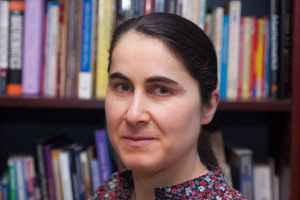Françoise’s research adds up to Maths prize
21 Mar 2012
A University of Manchester academic has won one of the oldest Maths awards.

Dr Françoise Tisseur was awarded the Adams Prize by The University of Cambridge for her research into numerical linear algebra.
The Adams Prize is awarded jointly each year by the Faculty of Mathematics and St John's College Cambridge to a young (normally under 40 years of age), UK-based researcher doing first class international research in the Mathematical Sciences.
This year's topic was ‘Computational Mathematics’ and, as well as Dr Tisseur, was awarded to Dr Sheehan Olver from The University of Oxford (currently University of Sydney).
The Adams Prize is named after the mathematician John Couch Adams and was endowed by members of St John's College. It is currently worth approximately £14,000.
The prize commemorates Adams's role in the discovery of the planet Neptune, through calculation of the discrepancies in the orbit of Uranus.
Dr Tisseur, who is currently an EPSRC Leadership Fellow, said: “Past winners of this prize form an illustrious list and it is an honour to join them.
“The School of Mathematics has been very supportive of my research and I'm proud to be working in one of the biggest and best numerical analysis groups in the world."
Professor Arieh Iserles, Chairman of the Adams Prize Adjudicators, said: "Dr Tisseur engaged with one of the outstanding computational challenges in linear algebra, the calculation of the spectra of polynomial eigenvalue problems. She has developed and investigated families of numerical methods which evaluate the eigenvalues of matrix pencils in a stable manner, robustly and at low computational cost.
“This work has had wide impact in many applications and will soon be incorporated into the leading software packages for numerical algebra.
"Sheehan Olver and Françoise Tisseur work in different corners of computational mathematics and scientific computing, yet they have both demonstrated their excellence in developing powerful algorithms and subjecting them to deep and effective mathematical analysis."
